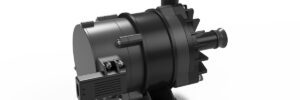
Aptera is not following the typical path for an EV startup. Rather than building a high-end luxury EV, it’s working to create the most efficient EV possible—a vehicle so efficient that integral solar panels can supply much of its charging needs.
It’s been a long road, but the company is getting close to releasing a production-intent vehicle, which will be used for further testing and validation over the coming months.
Over 60% of the equipment and tools used to make Aptera’s body structure have been completed and commissioned. Production parts for PI builds (production-intent vehicles) are being stamped and validated at manufacturing partner CPC Group, in Italy. At company HQ in San Diego, Aptera is preparing the lines and sourcing equipment for solar panel and battery manufacturing.
The road from conception to production of a new vehicle is a long and complex one (and many an EV startup has failed to reach the end). For Aptera the development stages leading up to the current Validation Phase included:
- Concept and ideation
- Design and engineering
- System development
- Computational Fluid Dynamics (CFD) simulation and modeling
- Prototyping and vehicle dynamics testing
- Solar testing and low-volume production
- Supplier selection and sourcing
- Manufacturing planning
The Validation Phase includes production of long-lead-time tools for Aptera’s Body in Carbon (BinC). These include the stamping dies and post-process tooling used to form Carbon Fiber-SMC with up to 5,000 tons of force into Aptera’s body parts.
Once the PI builds are complete, the company will use them for further testing and validation over several months, adding more and more production-intent components and ramping up to builds that include all production parts made with production equipment and tooling.
During the testing and validation phase, Aptera’s team will test suspension and dampeners, brake systems, airbags, thermal systems, the powertrain and battery, software and more. Next will come safety and crash testing, including regulatory compliance checks and quality assurance. In the manufacturing validation phase, production equipment and assembly lines will be fine-tuned and tested to streamline manufacturing processes and optimize precision.
Only once all these steps have been completed will the company commence production and prepare for the first deliveries.
Source: Aptera
from Charged EVs https://ift.tt/pmQT0xL


No comments:
Post a Comment